When the world burns, so do our hearts.
Forget inserting an IV line on the first try, or learning to read ABG results at a glance. Skill-based expertise and the minutiae of theory can always be revisited and refined in the years to come.
Here are the things I’ll carry from clerkship instead.
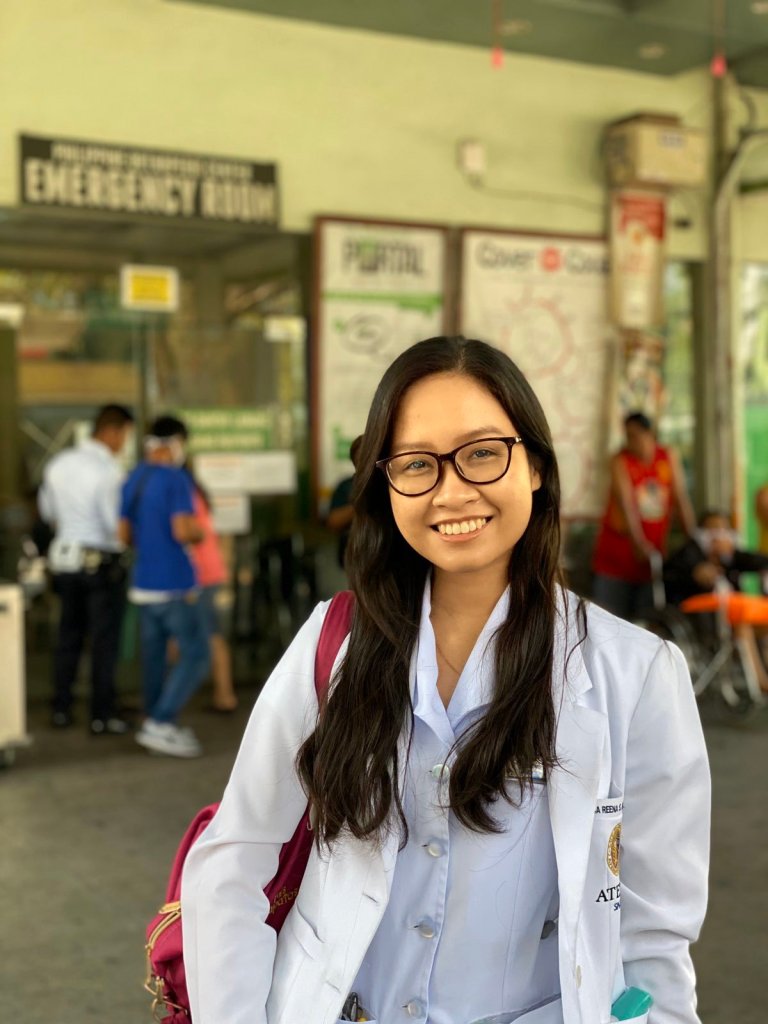
*This is also a s/p Community, Surgery, Orthopedics, Pediatrics and Clinical Skills post, as I completely forgot to write about those rotations thanks to the pandemic.
Nine things I learned in clerkship
Another batch of medical school graduates uploaded their graduation photos on social media today. Congratulations to batch 2020 of the University of the East Ramon Magsaysay Medical Center, especially to the cool kids we worked with in QMMC!
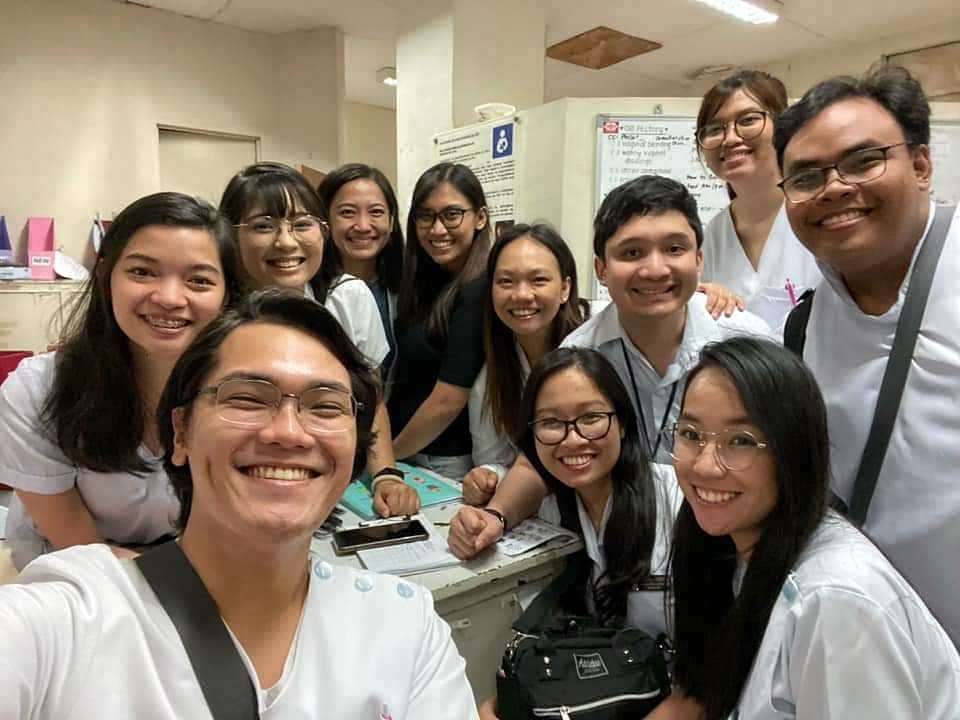
In a non-COVID alternate universe, our peers would be hosting big celebrations. Finishing four years of postgraduate study is a feat. There would be tarpaulins. They’d also be scrambling to finish requirements prior to post-graduate internship. (To clarify, ASMPH/Ateneo and UPCM students graduate after internship, not before.)
Our ASMPH interns have also officially finished their MD/MBA journey. Congratulations to batch 2020 of ASMPH! But word on the street is that the Physician Licensure Exam set on September 2020 will also be postponed to March 2021. That’s an entire generation of medical professionals who’ll have to study in a prolonged anxiety-riddled period. They’ll have to remain jobless longer, or resort to serving as “deputized physicians” under the Dept. of Health.
Or, like me, they’ll be searching for freelance work on the side. (Donate to my ko-fi or direct to PayPal!)
The world is shades darker and stranger than it was a year ago. But our dreams remain fierce, and tomorrow is still tomorrow.
Your belly burns
with dreams so fierce,
they convince you
tomorrow will be lit
almost entirely by their flames.
But tomorrow is still tomorrow.
Today, you must face the reality
that on a cold day,
imagined fires are scarcely enough.
Tolu Kehinde, MD-MBA, posted 2018
For the incoming clerks or nostalgic MDs, here are nine things I learned in clerkship.
I sincerely hope this helps make reality a little more exciting (in a good way).
#1: Be professional
Respect feels like the most important lesson in clerkship. Even 5-year-old kids know to respect people regardless of their position or job or age. But it’s somehow truer in clerkship.
Respect is being considerate of other people’s needs and doing positive actions to address those needs. This includes professionalism.
It’s important to respect people who are more senior than you. It’s not because of a blind respect for authority. It’s recognizing that your resident is more tired than you or maybe that your consultant has the greater mental and emotional burden of making life-saving or life-ending decisions. It’s acknowledging that ward nurses know more about the patients and their families than you do.
At the end of the day, clerks have virtually no legal liability to patients or to the hospital. Our exhaustion has no consequences aside from our own learning. In this way, in my opinion, other members of the health care team might just deserve to sit in the more comfortable chair or to choose what menu to order food from. It’s the little things.
And respect your peers. Respect their time. Don’t extend your lunch break into one hour, especially if other people are yet to eat. Do others the courtesy of finishing your part of the presentation on time. Don’t always pick the best deck in surgical assists or lunch breaks. (These are all my pet peeves).
I think one of the most contentious moments we had was the 7:00AM turnover in QMMCS. When you haven’t showered for 24 hours, even 2 minutes feel like a long time to wait for the duty team relievers. It’s strange coming from me, but be punctual.
#2: Show compassion
Basic human dignity is something that everyone has, all the time. Even if it’s 1PM and you haven’t had lunch, and the queue for morning OPD patients is still going strong at 50 more names to call, don’t take it out on the next person to sit in front of you. Be kind.
People like to quote Hippocrates and say that being kind and being professional is the absolute least that we can do as part of the medical team. It rings true.
Cure sometimes, treat often, comfort always.
Hippocrates
Respecting the dignity of patients means listening to their concerns without rude interruptions or impatient body language. It means going through the motions of introduction until explanation of the prescription. It means taking the time to wait for an examination room to free up, instead of checking their surgical scars right there in public.
Treat your patients as you’d want to be treated as a patient. Give them the courtesy of your attention. Be compassionate.
No matter how tired you are, always remember it’s probably even worse for your patients. They’re worried about being sick. If it’s a public hospital or charity clinic, they most likely spent all their money on the commute. They probably waited hours longer than you think –the OPD queue in Philippine Orthopedic Center, for example, starts around 5AM.
And yet sometimes they still have the energy to do the most heartwarming things. Pay it forward.

#3: Take care of yourself
In terms of respect, something you should never forget is to also respect yourself. Respect your body. Respect your time.
I say this now with the hindsight of someone who had to take sick leave for 5 days straight. I woke up with a 38C fever and still tried to push myself into going to work. Long story short, the painkillers and Paracetamol didn’t work, and my flu became much worse.
Treat yourself with the dignity you deserve. It might seem like the end of the world to be absent from duty, but getting even sicker won’t do yourself, your patients, or your teammates any favors.
Similarly, don’t be too hard on yourself when you forget to do something or when you choose to binge-eat instead of brushing up for didactics. You’re only human!

After that, I learned to wake up early enough to squeeze in 15 minutes of exercise AND breakfast. I took my vitamins. Peak self-care.
#4: Love your “least liked” rotation
Everyone has that rotation that they really dread. For me, it was literally any surgical rotation. I love anatomy and I’m not squeamish about blood, but there was something about surgery as a field that I almost disliked.
I never considered surgery as a career (mainly because I don’t want to rely too much on my hands, in case an improbable Dr.Strange-esque accident happens). I felt like surgical fields sans obstetrics had the most to contend when it comes to sexism in medicine. I also thought changing into scrubs was a hassle. LOL.
But I had to figure out a way to deal with it. As a clerk or intern, you can’t escape the major and minor surgical rotations. And I didn’t want to keep going to work with dread in my heart.
At some point I did some reverse psychology on myself and tried to slingshot into loving surgery instead. There were many pros: it looks cool, you get to feel around a person’s innards, the anatomy-physiology-treatment correlates are absolutely unparalleled, I’ll never enter a surgical suite ever again after I graduate…
And there was something seriously gratifying about suturing a patient yourself. I can’t go into details here for obvious reasons, but I was really proud of the first time I stitched up a laceration in the EAMC ER by myself.
So yeah! I’m excited about surgical assignments now, mostly because I convinced myself that (a) assisting in major operations is a rare opportunity that I’ll never get again after I graduate and (b) I really only need to assist and follow directions and not much else.
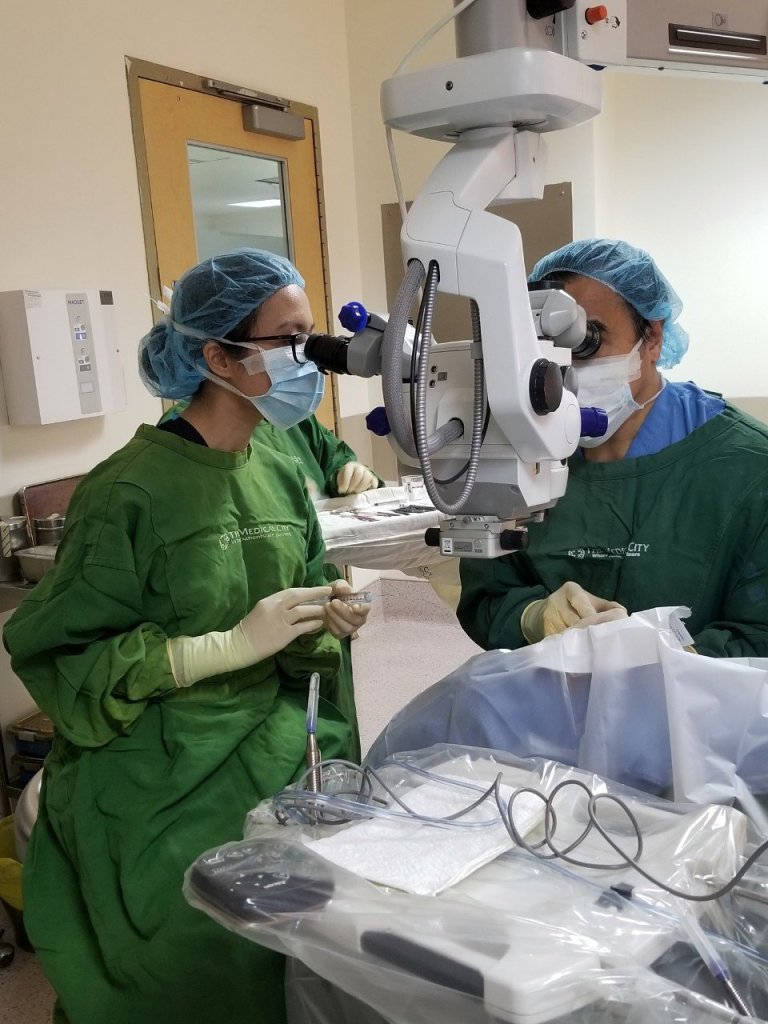
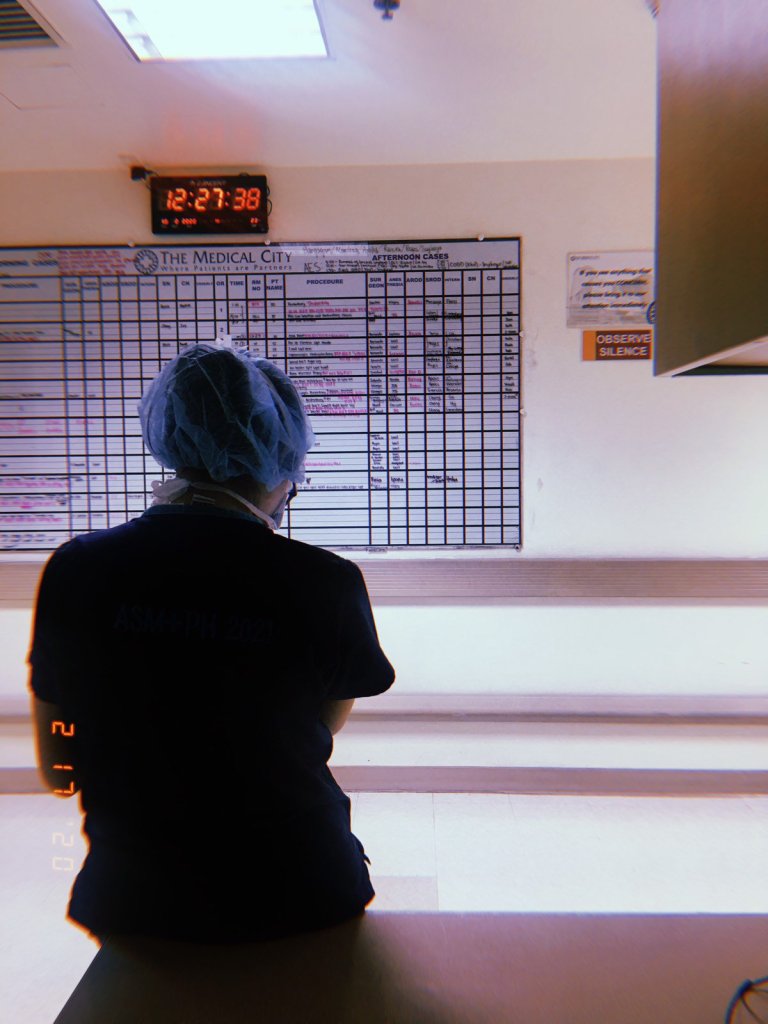
#5: Trust your duty group
Having to interact with the same set of people days at a time was a challenge. As a Type A person (not that I put a lot of stock into that binary concept), I can have very high standards for myself and other people. Sometimes I’m lazy with a laissez-faire attitude, but in most instances of group work I like to micromanage and whip people into metaphorical shape.
So it was hard seeing bits of incompetence here and there. I was assertive enough to post criticisms in our group chat –incomplete record-keeping, neglected errands, mistakes in presentations– but I also knew that I had to temper myself. I couldn’t keep running myself and others ragged. If that level of output satisfied them, then I guess I’ll have to compromise.
As long as actual patient care wasn’t compromised, that is.
This is a lesson I’m still learning, which I think first began in the early years of medical school. I never thought I was a perfectionist until I found myself in ASMPH. Maybe it’s the broader mix of people and group activities. Trusting others to do even the bare minimum is still a process.
Learn to let things go.
#6: Love your team
I may be a bit of a perfectionist, but I was definitely not perfect during clerkship. I made mistakes. I was rude. I felt discouraged. I kept falling asleep during conferences.
But what’s stronger than respect, what overcomes disappointment, what keeps you going? Love.
You can’t spend time with people 24/7 without falling a little bit in love with them. (So this is less of a thing I learned in clerkship and more of an inevitable fact of life. Either you fall apart or you change your heart.)

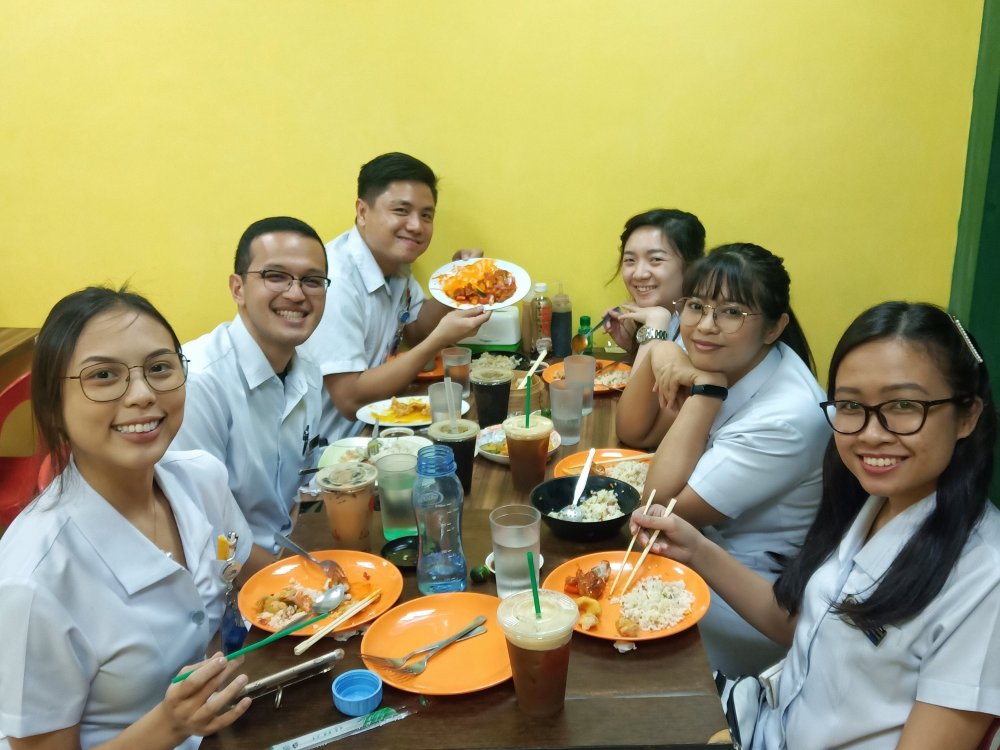


#7: Stay well-equipped
It was January 2020 and I was in line in the mini-lab of the EAMC ER. A resident from another specialty approached and asked me if I had a pair of scissors. At that moment, I was holding so many blood collection tubes and my pockets were filled with so many things that I had no idea where anything was. I was a mess.
He had such a weird look on his face when I said I didn’t think I had a pair of scissors on me. Eventually, I told the resident to wait while I checked all EIGHT of my full pockets. Turns out I had one. Tada.
So the moral of the story is that when it comes to tools, everyone expects clerks to be well-equipped. Interns, residents, fellows and especially consultants bring next to nothing compared to the average clerk. I’ve lent my stethoscope to at least two attendings and several more residents.
(It’s like the more things you have in your brain, the less things you have to physically bring with you.)
Over the last few days of online clerkship, I spent some time procrastinating making “clerkship essentials”, a couple of graphic guides on the material must-haves of any well-equipped clerk.
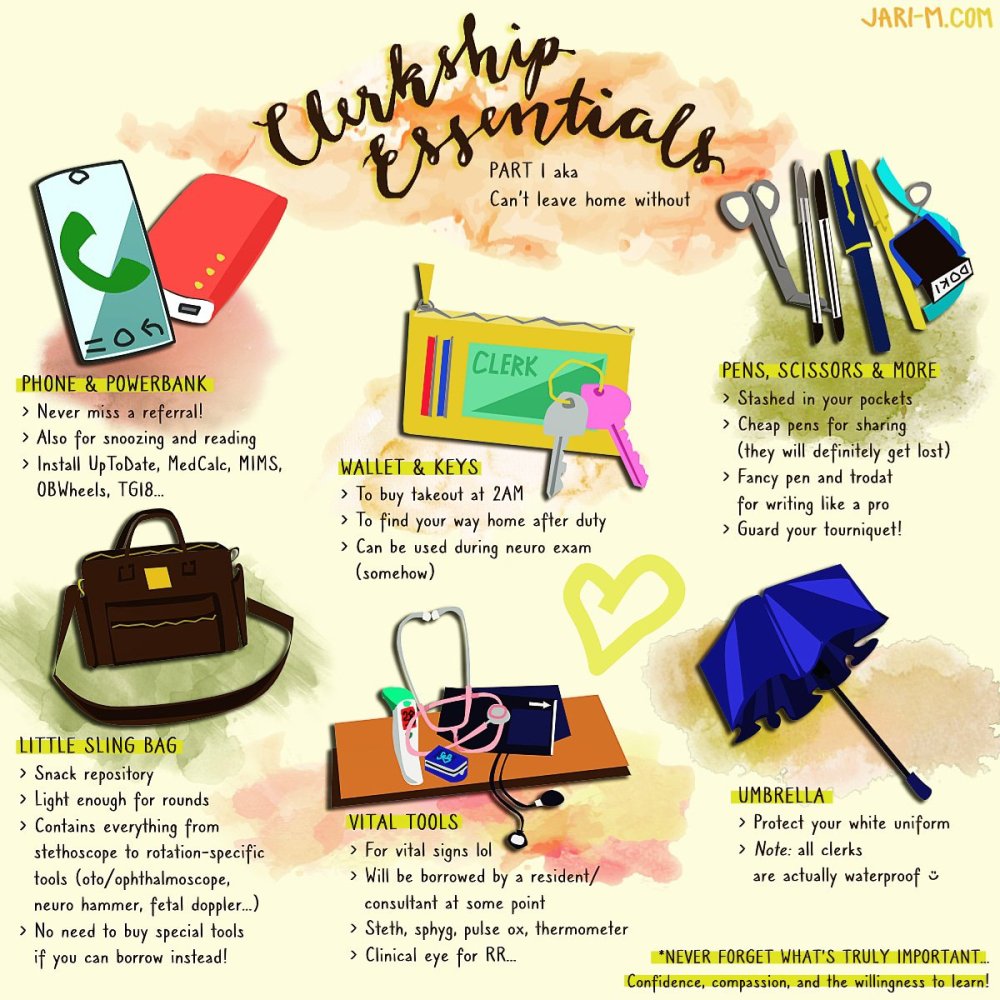
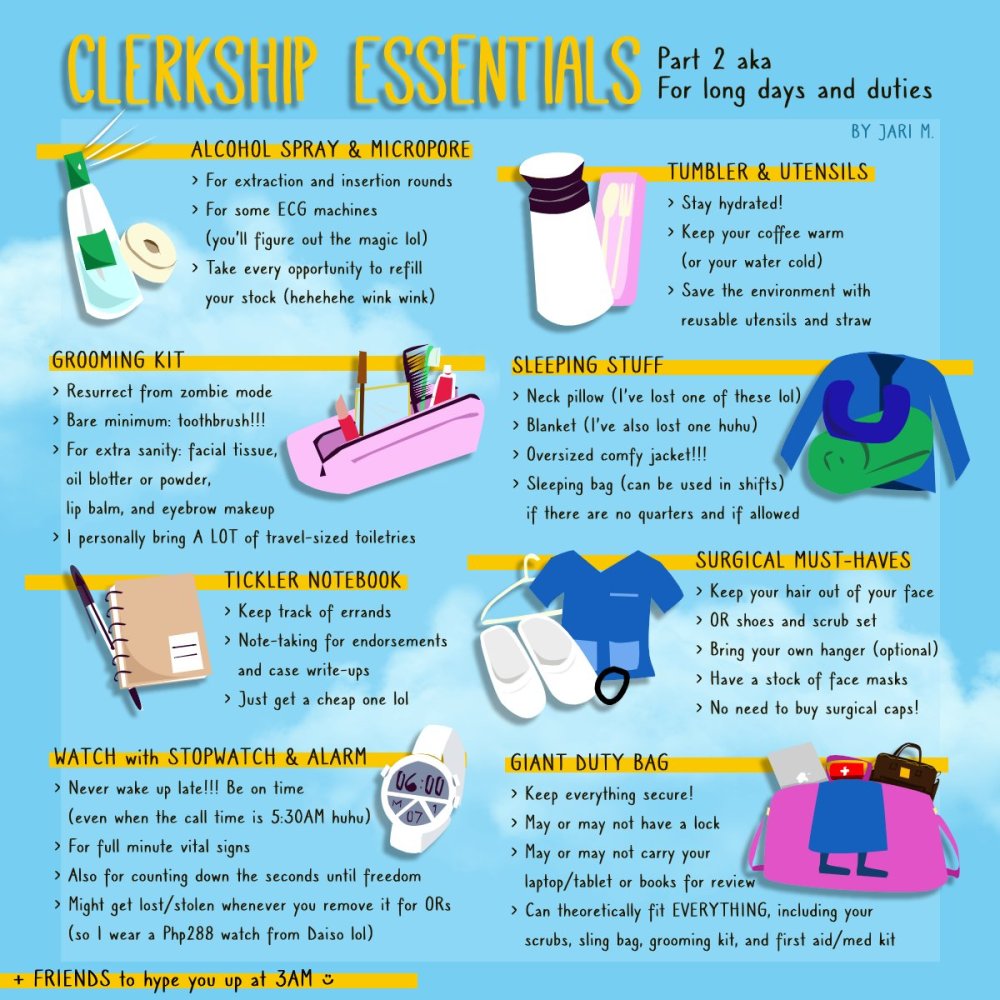
#8: Take shameless advantage of being a clerk
I could have written “take every opportunity to learn” or “thirst for knowledge”, but “take shameless advantage of being a clerk” is really what I want to say…
I think of this as the Clerk Paradox. On one hand, you are at the bottom of the hospital totempole. You get the joy of collecting and measuring urine output. You get all the blood extraction and IV insertion errands in the dead of the night. You run around for everyone’s food orders while juggling other work.
On the other hand, you’re on top of the learning food chain. Clerks have the shameless privilege of being a tuition-paying medical student, also known as the ability to ask attendings questions on theory and not get your head chewed off. And, unlike interns and residents, clerks also have the privilege of answering questions incorrectly. People literally expect you to know nothing! It’s all about best effort from day one.
So please, take advantage of every opportunity to learn, whether it’s medical tidbits from the consultant doing rounds or life lessons from an empathic preceptor. Be shameless.
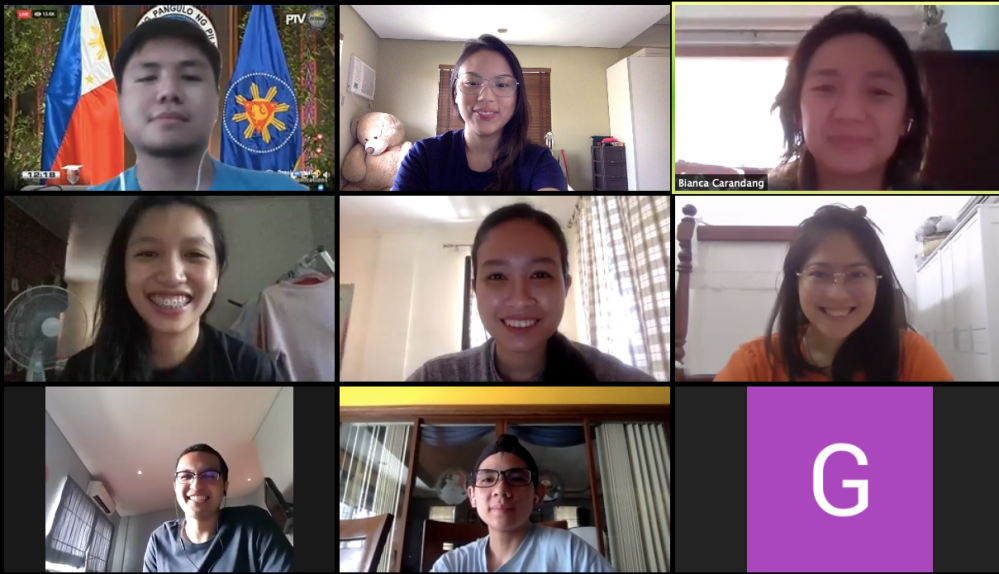
#9: Keep going
One rainy and windy morning, I was walking on my way to TMC ER duty. It was the first month of clerkship. My umbrella was absolutely useless. My socks were soaked. My white pants were muddied past my calves. Cars just kept speeding by without care for how they splashed innocent sidewalk commuters. I had 12 more hours in the same uniform ahead of me. And I thought, maybe I should just turn back. Clinical clerks weren’t made to be waterproof.
But ten or so meters ahead of me was a pair of ASMPH interns also braving the rain. They were talking to each other. They kept walking despite their equally muddy white slacks. Their day was probably going to be longer than mine. They kept going.
In the end, so did I.
Clerkship taught me to believe in myself and to believe in the people around me. It taught me that there will be times when I think I won’t survive the day. When I might not even want to start the day. There will be moments where I will despair and rethink my life choices. It’ll be lonely. It’ll feel weird to see peers succeed in other careers. And yet it was fine. Miraculously, unbelievably. You’ll get through it.
(Even if you have to write your MBA capstone paper during your free time.)
There will be people who will always believe in you. Your family will be one call or just several weekends away. So will your non-medical friends. And you’ll learn to see how kind people in the hospital and community can be.
Your interns will guide you through every post and every task, as long as you ask. They’ve been through the same experiences as you. They’ll understand. Your nurses will encourage you to do your best with even the ‘worst’ patients. You’ll probably laugh with them at least once every duty. Your residents will forgive mistakes if they were made despite best efforts. Your consultants will take your mistakes in good faith, and tell you to try and try again.
And then, hopefully, you’ll learn to have faith in institutions that are meant to protect you –the local government, the hospitals, the school, the medical community. In the clearest days, it’s easy to see that everyone wants the best for every patient and every medical professional as well.
(The national government is a different story.)
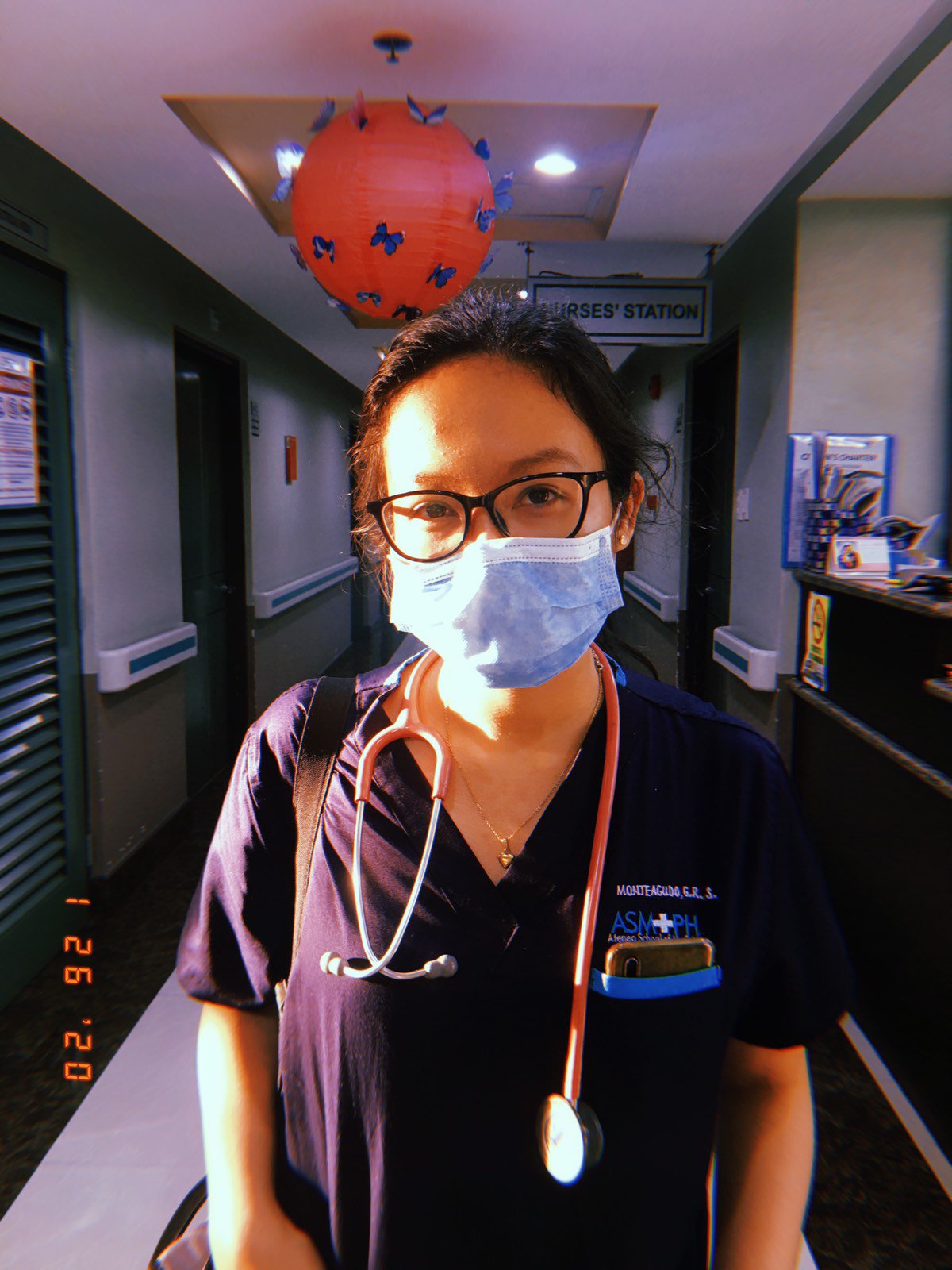
If you’re an incoming clerk or junior intern, you’re more than halfway done with your medical school journey. Congratulations!
Your journey will definitely be different. A pandemic. An economic crisis. Distance learning. Online clerkship.
But when the world burns, so should our hearts. Keep going. 👑
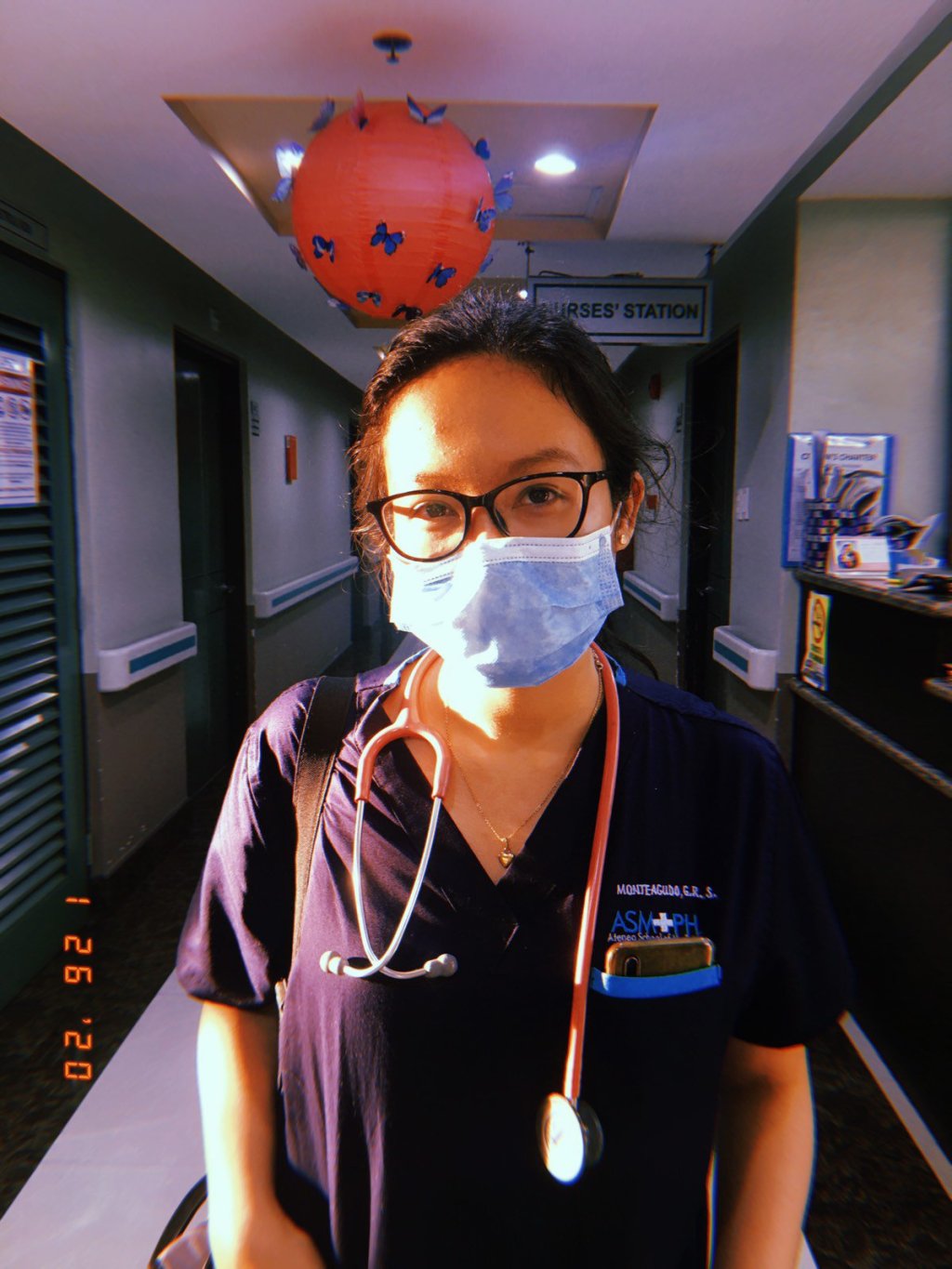
Leave a reply to jari m Cancel reply